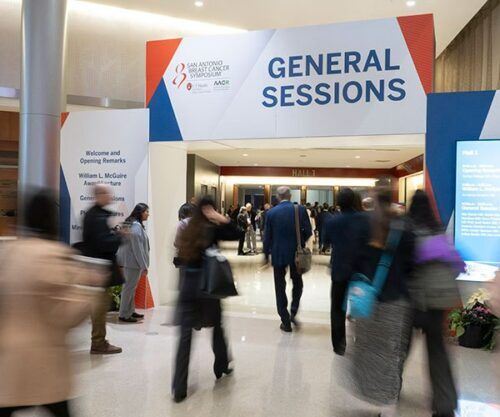Lumpectomy vs. Mastectomy: Breaking Down the Differences

Here’s what to know about the differences between lumpectomy and mastectomy to help you make an informed decision
When you’re diagnosed with breast cancer, you’ll likely need to start thinking about treatment decisions right away. If you’re like most breast cancer patients, surgery will be part of your treatment plan, but which type of surgery is right for you?
Thanks to medical advances, more women with breast cancer have the choice of undergoing a lumpectomy with radiation or a mastectomy. While having more treatment options is always better, deciding between lumpectomy vs. mastectomy can be difficult.
Here, you’ll learn more about these procedures, the circumstances when doctors are likely to recommend them, the pros and cons of each one, and more.
Lumpectomy vs. mastectomy basics
A lumpectomy — also called breast conserving surgery and partial mastectomy — removes a portion of tissue from the breast that includes the tumor and a thin layer of healthy tissue surrounding it (margin). It’s important to note that the procedure is followed by radiation therapy, which helps lower the risk that your cancer will return.
A lumpectomy with radiation is most often used to treat early-stage breast cancer (stages 1 and 2), though it may be an option at stage 3 if you have large breasts and the cancer hasn’t invaded nearby tissue. Your doctor may be more likely to recommend a lumpectomy vs. mastectomy to treat smaller tumors (less than two inches) that are also small compared to the size of the breast.
A mastectomy is a more aggressive procedure in which the whole breast is removed, including the nipple, areola, skin, and the tissue that covers the main chest muscle (pectoralis major). However, there are different types of mastectomies that can preserve the skin (skin-sparing mastectomy) and nipple (nipple-sparing mastectomy.)
Your doctor may be more likely to recommend mastectomy vs. lumpectomy if you have a tumor that’s larger than two inches or is large compared to the size of your breast, or if you have multiple areas of cancer in the breast that aren’t close to each other. Mastectomy is an option if you have early-stage breast cancer or stage 3 breast cancer. Surgery is usually not recommended for stage 4/metastatic breast cancer patients because the cancer has already spread to distant tissues.
Lumpectomy and radiation is also typically used to treat ductal carcinoma in situ (DCIS), a pre-invasive form of breast cancer that’s also known as stage 0. Mastectomy is not as common for DCIS but may be recommended in certain situations.
Lumpectomy advantages and disadvantages
Advantages of lumpectomy vs. mastectomy include:
- You can keep most of your breast tissue when you get a lumpectomy, so the breast maintains more of its natural look. And unlike a mastectomy, you can usually keep the nipple and surrounding area as well.
- A lumpectomy preserves sensation in the nipple, skin, and chest wall.
- It’s a short procedure, and you’ll most likely be able to go home the same day.
- A lumpectomy has a faster recovery time.
Disadvantages of lumpectomy vs. mastectomy include:
- You may experience changes in the shape and appearance of the breast, such as dents and divots.
- You may need more surgery if the pathologist finds cancer cells in the margin.
- Your doctor may advise against a lumpectomy in certain situations, such as if you’re unable to undergo radiation after surgery, have several areas of cancer in the breast, or the breast was previously treated with radiation or a lumpectomy.
- A lumpectomy may not be a good choice if you have inflammatory breast cancer or if you have a gene mutation such as BRCA1, BRCA2, or ATM that can raise your risk of a second breast cancer.
Mastectomy advantages and disadvantages
Advantages of a mastectomy vs. a lumpectomy include:
- Radiation isn’t always necessary following a mastectomy.
- A mastectomy is usually the preferred choice if you have a gene mutation that raises your risk of recurrence.
- For some women, getting a mastectomy provides greater peace of mind. While a mastectomy isn’t necessarily more effective than a lumpectomy (more on that below), it is important to consider your emotional well-being when you make your decision.
- If you choose a mastectomy without reconstruction, you’re less likely to need additional surgeries.
Disadvantages of a mastectomy vs. a lumpectomy include:
- Recovery time from a mastectomy is longer compared to a lumpectomy.
- Most patients experience permanent loss of sensation in the chest skin, nipple, and areola, which can affect quality of life.
- Getting a mastectomy can be more emotionally difficult since you’re losing the entire breast.
- Your risk of complications such as pain, infection, bleeding, and swelling is higher when you get a mastectomy.
Lumpectomy vs. mastectomy recovery time
Recovery time from a lumpectomy is shorter since it’s a less-invasive procedure than a mastectomy. Most patients can return to their usual activities in five to 10 days, while those who undergo a mastectomy typically need three to four weeks to start feeling like themselves again. If you have a mastectomy and breast reconstruction, the recovery process is longer, lasting to six to eight weeks.
Choosing between lumpectomy vs. mastectomy
Clearly, there’s a lot to consider when you have the choice between a mastectomy vs. lumpectomy. The good news is that you and your doctor will work together to make the decision—it’s not something you have to figure out alone. He or she can go over the pros and cons of each procedure as many times as you need and help you identify your greatest priorities and concerns in choosing one procedure over the other.
Perhaps the most common concern patients have is whether their cancer is more likely to recur if they get a lumpectomy. But for most women newly diagnosed with breast cancer who have an average risk of recurrence, getting a mastectomy vs. lumpectomy with radiation does not reduce the risk the cancer will return, nor does it improve survival benefits over the long term. It’s important to keep in mind that your doctor would not offer you the option of a lumpectomy or mastectomy if the long-term health outcomes of each procedure weren’t so similar.
Patient satisfaction rates of lumpectomy vs. mastectomy are also roughly the same. A study of breast surgery patients published in Cureus found that overall satisfaction of all aspects of surgical treatment was 68.6 percent for lumpectomy patients and 70.9 percent for mastectomy patients.
Weighing a lumpectomy vs. mastectomy
Whether to undergo a mastectomy vs. lumpectomy is a big decision. Make sure you fully understand what both surgeries will entail, how they will change your breasts, and what other treatments will be required. Don’t be afraid to ask your doctor more questions or even get a second opinion to help you feel confident in your decision.
Selected References 
Ferrara, N. (2025, February 19). Mayo Clinic Q and A: How to decide which breast cancer surgery is right for you – Mayo Clinic Comprehensive Cancer Center Blog. Mayo Clinic Comprehensive Cancer Center Blog. https://cancerblog.mayoclinic.org/2025/02/05/mayo-clinic-q-and-a-how-to-decide-which-breast-cancer-surgery-is-right-for-you/
Breast-conserving surgery (Lumpectomy) | Treating breast cancer. (n.d.). American Cancer Society. https://www.cancer.org/cancer/types/breast-cancer/treatment/surgery-for-breast-cancer/breast-conserving-surgery-lumpectomy.html
Professional, C. C. M. (2025, March 19). Lumpectomy. Cleveland Clinic. https://my.clevelandclinic.org/health/procedures/12962-lumpectomy
Admoun, C., & Mayrovitz, H. (2021). Choosing Mastectomy vs. Lumpectomy-With-Radiation: Experiences of Breast Cancer Survivors. Cureus. https://doi.org/10.7759/cureus.18433
Blackburn, K. B. (2021, May 18). Lumpectomy: What it is, what to expect and recovery for breast cancer patients. MD Anderson Cancer Center. https://www.mdanderson.org/cancerwise/lumpectomy-for-breast-cancer-treatment–what-it-is–what-to-expect-and-recovery.h00-159460845.html
Breast Reinnervation: Restoring Sensation after Mastectomy | Patient Care. (n.d.). Weill Cornell Medicine. https://weillcornell.org/news/breast-reinnervation-restoring-sensation-after-mastectomy
Lumpectomy: what to expect at home | Kaiser Permanente. (n.d.). Kaiser Permanente. https://healthy.kaiserpermanente.org/health-wellness/health-encyclopedia/he.lumpectomy-what-to-expect-at-home.ug3388
Inflammatory breast Cancer | Details, diagnosis, and signs. (n.d.). American Cancer Society. https://www.cancer.org/cancer/types/breast-cancer/about/types-of-breast-cancer/inflammatory-breast-cancer.html
10 things you should know about oncoplastic breast surgery. (n.d.). WebMD. https://www.webmd.com/breast-cancer/ss/10-things-you-should-know-about-oncoplastic-breast-surgery
Conner, K. (2023, July 25). What is oncoplastic lumpectomy surgery? https://www.breastcancer.org/treatment/surgery/breast-reconstruction/types/oncoplastic-lumpectomy
Dougherty, B. (2023, October 27). Lumpectomy vs. Mastectomy: Five Things to Consider. Dana-Farber Cancer Institute. https://blog.dana-farber.org/insight/2023/10/lumpectomy-vs-mastectomy-five-things-to-consider/
Anthony, K. (2024, July 29). Lumpectomy vs. Mastectomy: Which is Best for You? Healthline. https://www.healthline.com/health/lumpectomy-vs-mastectomy#pros-and-cons
Choosing between breast conserving surgery (lumpectomy) or mastectomy. (n.d.). https://www.cancerresearchuk.org/about-cancer/breast-cancer/treatment/surgery/lumpectomy-or-mastectomy
Shannonhouse, R. (2024, October 8). Mastectomy vs. Lumpectomy. WebMD. https://www.webmd.com/breast-cancer/mastectomy-vs-lumpectomy
Hamid, S. A., Bakkila, B., Schultz, K. S., Grimshaw, A. A., Gunderson, C. G., Godfrey, E. L., Lee, C., Berger, E., Rosenberg, S., & Greenup, R. A. (2024). “Peace of Mind” After Mastectomy: A scoping review. Annals of Surgical Oncology, 31(8), 5168–5179. https://doi.org/10.1245/s10434-024-15360-3
Geng, C. (2021, May 10). Choosing between a lumpectomy and a mastectomy. https://www.medicalnewstoday.com/articles/lumpectomy-vs-mastectomy#mastectomy-pros-and-cons









